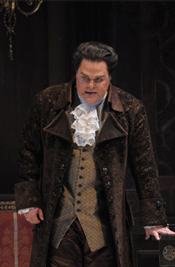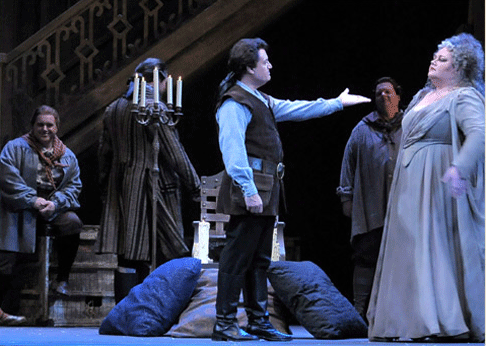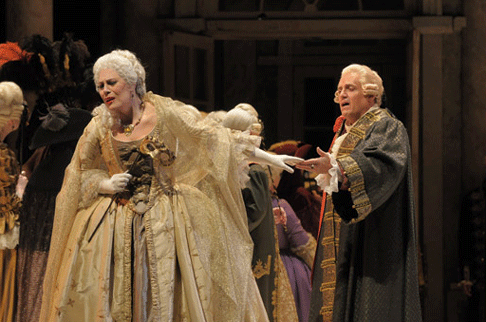![Sondra Radvanovsky as Amelia and Frank Lopardo as Gustavo [Photo by Dan Rest courtesy of Lyric Opera of Chicago]](http://www.operatoday.com/Ballo_Chicago04.gif)
05 Jan 2011
Un ballo in maschera at its roots
In its production this season of Verdi’s Un ballo in maschera Lyric Opera of Chicago has staged the work in its original locale at the royal court of Sweden.
English Touring Opera are delighted to announce a season of lyric monodramas to tour nationally from October to December. The season features music for solo singer and piano by Argento, Britten, Tippett and Shostakovich with a bold and inventive approach to making opera during social distancing.
This tenth of ten Live from London concerts was in fact a recorded live performance from California. It was no less enjoyable for that, and it was also uplifting to learn that this wasn’t in fact the ‘last’ LfL event that we will be able to enjoy, courtesy of VOCES8 and their fellow vocal ensembles (more below …).
Ever since Wigmore Hall announced their superb series of autumn concerts, all streamed live and available free of charge, I’d been looking forward to this song recital by Ian Bostridge and Imogen Cooper.
Although Stile Antico’s programme article for their Live from London recital introduced their selection from the many treasures of the English Renaissance in the context of the theological debates and upheavals of the Tudor and Elizabethan years, their performance was more evocative of private chamber music than of public liturgy.
Evidently, face masks don’t stifle appreciative “Bravo!”s. And, reducing audience numbers doesn’t lower the volume of such acclamations. For, the audience at Wigmore Hall gave soprano Elizabeth Llewellyn and pianist Simon Lepper a greatly deserved warm reception and hearty response following this lunchtime recital of late-Romantic song.
For this week’s Live from London vocal recital we moved from the home of VOCES8, St Anne and St Agnes in the City of London, to Kings Place, where The Sixteen - who have been associate artists at the venue for some time - presented a programme of music and words bound together by the theme of ‘reflection’.
'Such is your divine Disposation that both you excellently understand, and royally entertaine the Exercise of Musicke.’
‘And there was war in heaven: Michael and his angels fought against the dragon; and the dragon fought and his angels, And prevailed not; neither was their place found any more in heaven … that old serpent … Satan, which deceiveth the whole world: he was cast out into the earth, and his angels were cast out with him.’
There was never any doubt that the fifth of the twelve Met Stars Live in Concert broadcasts was going to be a palpably intense and vivid event, as well as a musically stunning and theatrically enervating experience.
‘Love’ was the theme for this Live from London performance by Apollo5. Given the complexity and diversity of that human emotion, and Apollo5’s reputation for versatility and diverse repertoire, ranging from Renaissance choral music to jazz, from contemporary classical works to popular song, it was no surprise that their programme spanned 500 years and several musical styles.
The Academy of St Martin in the Fields have titled their autumn series of eight concerts - which are taking place at 5pm and 7.30pm on two Saturdays each month at their home venue in Trafalgar Square, and being filmed for streaming the following Thursday - ‘re:connect’.
The London Symphony Orchestra opened their Autumn 2020 season with a homage to Oliver Knussen, who died at the age of 66 in July 2018. The programme traced a national musical lineage through the twentieth century, from Britten to Knussen, on to Mark-Anthony Turnage, and entwining the LSO and Rattle too.
With the Live from London digital vocal festival entering the second half of the series, the festival’s host, VOCES8, returned to their home at St Annes and St Agnes in the City of London to present a sequence of ‘Choral Dances’ - vocal music inspired by dance, embracing diverse genres from the Renaissance madrigal to swing jazz.
Just a few unison string wriggles from the opening of Mozart’s overture to Le nozze di Figaro are enough to make any opera-lover perch on the edge of their seat, in excited anticipation of the drama in music to come, so there could be no other curtain-raiser for this Gala Concert at the Royal Opera House, the latest instalment from ‘their House’ to ‘our houses’.
"Before the ending of the day, creator of all things, we pray that, with your accustomed mercy, you may watch over us."
The doors at The Metropolitan Opera will not open to live audiences until 2021 at the earliest, and the likelihood of normal operatic life resuming in cities around the world looks but a distant dream at present. But, while we may not be invited from our homes into the opera house for some time yet, with its free daily screenings of past productions and its pay-per-view Met Stars Live in Concert series, the Met continues to bring opera into our homes.
Music-making at this year’s Grange Festival Opera may have fallen silent in June and July, but the country house and extensive grounds of The Grange provided an ideal setting for a weekend of twelve specially conceived ‘promenade’ performances encompassing music and dance.
There’s a “slide of harmony” and “all the bones leave your body at that moment and you collapse to the floor, it’s so extraordinary.”
“Music for a while, shall all your cares beguile.”
The hum of bees rising from myriad scented blooms; gentle strains of birdsong; the cheerful chatter of picnickers beside a still lake; decorous thwacks of leather on willow; song and music floating through the warm evening air.
![Sondra Radvanovsky as Amelia and Frank Lopardo as Gustavo [Photo by Dan Rest courtesy of Lyric Opera of Chicago]](http://www.operatoday.com/Ballo_Chicago04.gif)
In its production this season of Verdi’s Un ballo in maschera Lyric Opera of Chicago has staged the work in its original locale at the royal court of Sweden.
Stage director Renata Scotto has achieved a believably dignified and fluid progression of scenes leading up to the tragedy of misunderstandings. The role of King Gustavus III of Sweden is taken by Frank Lopardo, while that of Amelia his beloved features soprano Sondra Radvanovsky. Baritone Mark Delavan sings Count Anckarström, husband of Amelia as well as close friend of the King. The travesti role of the page Oscar is sung by Kathleen Kim and Mme. Arvidson signaled the debut at Lyric Opera of Stephanie Blythe. Through a sensitive approach to tempos Asher Fisch conducted a meaningful account of one of Verdi’s most lyrical scores.
 Mark Delavan as Renato
Mark Delavan as Renato
The principals in the first scene of Act I establish themselves immediately
in the movements and dramatic interchange of this production. The
ballo of the final scene is, of course, foreshadowed now by means of a
list of invited guests for the event of the present evening. As the curtain
opens on the reception room of an eighteenth-century court, both supporters and
detractors of Gustavus give vent to their feelings. The page Oscar, so often in
this work a dramatic hinge, announces the King’s arrival with the famous
line, “S’avanza il Re.” [“The King approaches”]
In the role of Oscar Ms. Kim moves nimbly and projects her lines with a
delighted urgency. The event of this evening’s ballo is now used
as a means to stir the King’s emotions in the first of that
character’s arias. When Gustavus sees in the list his beloved
Amelia’s name, he sings rapturously of expecting her presence that night.
Mr. Lopardo’s introductory declamation and performance of “La
rivedrà nell’estasi” [“what ecstasy to see her again”]
are exemplary: in both parts of the scene he demonstrates an assured skill in
legato with effective touches of vocal color on significant phrases, such as
“E qui sonar d’amore.” [“and music of love.”]
When the petitioners are instructed to leave, Oscar shows in Count Anckarström
who now advises the King on matters of the court. As he warns Gustavus of a
plot against his life, Anckarström’s lines rise upward with dramatic
force. A similar vocal technique is needed in the baritone Anckarström’s
first solo piece, “Alla vita che t’arride,” [“To your
life so promising”], which occurs before Oscar reenters. It is in such
transitional moments that Mr. Delavan’s interpretation falls short. His
reach to an upper register becomes noticeably detached from the preceding lines
so that dramatic effects do not match his intended goal. The conclusion of this
scene, devoted to varying opinions of the fortuneteller Mme. Arvidson,
highlights both individual and ensemble work. Once the judge declares that Mme.
Arvidson should be banished because of witchcraft, Oscar issues a spirited
defense of the woman in that character’s first solo aria, “Volta la
terrea” [“the sallow one turned”]. Ms. Kim tosses off this
piece with secure vocal agility, while she acts out the noted appeal of the
sorceress with movement and dramatic gesture. Gustavus resolves to visit her
hovel despite the protestations of individual courtiers, the plan for this
adventure being affirmed in a rousing conclusion.
 Frank Lopardo as Gustavo and Stephanie Blythe as Ulrica
Frank Lopardo as Gustavo and Stephanie Blythe as Ulrica
The second scene of the act introduces both the characters Mme. Arvidson and Amelia. In her interpretation of the fortuneteller Ms. Blythe uses all facets of her rich vocal range. Her hushed, piano intonations in the first part of her incantation to Lucifer are followed by excitingly ringing top notes, while she signals her enhanced communication with the forces beyond. As she concludes with a thrilling and extended chest note on “Silenzio!”, Ms. Blythe’s disheveled persona looks truly possessed. She prophesies riches and rank for the sailor Cristiano, who is convincingly sung and acted in this production by Paul La Rosa. After he is sent off — the entire scene being observed from a distance by the disguised King Gustavus — Amelia enters and solicits the intercession for her part of Mme. Arvidson. She begs for a solution to her emotional attraction to Gustavus, which has distracted her from duty. Mme. Arvidson tells her to pick at night a magic herb growing at an isolated gallows outside the city. Even in this relatively brief exchange Ms. Radvanovsky communicates in her liquid vocal lines a sense of urgency, hinting at her extended prayer in the subsequent act. The trio which now follows indeed features her first prayer to God, while Mme. Arvidson encourages her daring to find the herb and Gustavus, still unseen, simultaneously promises to follow. [“Consentimi, o Signore” (“Grant to me, o Lord”)]. Here Ms. Radvanovsky’s voice soars in her appeals for help, such that she effectively binds the trio into a crescendo of determination. In the final part of the scene following Amelia’s departure Gustavus emerges and demands that the fortuneteller predict his future. When Mme. Arvidson sees the sign of death in his palm, the reaction “Presto morrai” [“Soon you will die”] is delivered by Ms. Blythe with chilling certainty in her intonation. Gustavus laughs off the divination and clasps the hand of Anckarström, hence sealing the prediction that he will die by the hand of the next person whom he thus greets.
In the constellation of beloved and spouse which makes up the shorter second act of Un ballo the emotions and conflicts introduced earlier develop into a turning point for the principals. After appropriately fast and bright tempi under Fisch’s direction, Amelia enters at the isolated gallows while snow falls. As she reaches for the herb, she recoils in fear, which Radvanovsky emphasizes with a distinct intonation on “terrore.” In her following aria, “Ma dall’irido stelo” [“But when from the dry stem”], she sings with great pathos, her tone moving from lament to self-encouragement and ending in the touching prayer for divine support. Throughout the aria, and notably in the final ascent and following “Miserere,” Radvanovsky exhibits the ideal Verdian soprano range, assured middle and upper registers bound seamlessly with admirable breath control. When Gustavus enters and declares “Teco io sto” [“I am here with you”], the subsequent duet allows both to admit their love. At first Amelia protests that the King should leave her, a line that Radvanovsky sings with telling diminuendo on “Mi lasciate.” During the well-known scene Lopardo’s voice blooms in lyrical abandon as Gustavus is transported by the assurance of Amelia’s love. Lopardo’s tasteful performance of top notes in the duet is matched by Radvanovsky’s line as the two singers blend vocally toward each other. Soon after the declaration of love a warning alerts the King of Cout Anckarström’s approach. Gustavus entrusts the veiled Amelia to Anckarström and asks his friend to accompany the unnamed woman back to the court. Although Anckarström had come to warn the King of a plot against his life, loyalties soon shift: Amelia’s veil drops when she tries to protect her husband and the latter perceives his wife’s emotional betrayal. In the final ensemble, at which the Count is mocked by the courtiers returning to court, Amelia’s final notes, as here performed, give expression to her sense of an undeniable love with a tragic outcome.
 Sondra Radvanovsky as Amelia and Frank Lopardo as Gustavo
Sondra Radvanovsky as Amelia and Frank Lopardo as Gustavo
In Act III the Count gives vent to his anger as the two arias of the first scene reflect on the couple’s marriage. When the Count threatens to have Amelia killed, she begs for the opportunity to see her child one last time. Radvanovsky’s approach to the aria, “Morrò, ma prima in grazia,” [“I shall die, but first in mercy”], evinces a number of vocal touches that blend ideally with the orchestra to express her character’s suffering. Once she leaves, the Count sings of his own anguish and the betrayal he feels at the King’s behavior. In Delavan’s approach to “Eri tu” [“It was you”] an admirable sense of legato is marred by an attack stronger than necessary at the beginning of lines. The conspirators now enter and the Count throws in his lot with them against the King. When Amelia returns, she is forced to choose the name of the one privileged to slay the King. As the scene ends with the Count’s name selected and the venue of the ball announced, the vocal ensemble rises in excitement to the fateful evening.
In the final scene before the ball, when the Count indeed shoots the King fatally, Gustavus performs his last aria alone, while musing on his devotion for Amelia yet his resolve to send the couple away from court. As his voice moves here through successive phrases with an exquisite sense of line, Lopardo echoes the love expressed in his earlier scenes but now with an appropriate foreboding on “del nostro amor” [“of our love”]. His inevitable death at the hands of the Count is accompanied by a moving declaration of Amelia’s innocence, her own voice then rising expressively in horror at the turn of events.
Salvatore Calomino